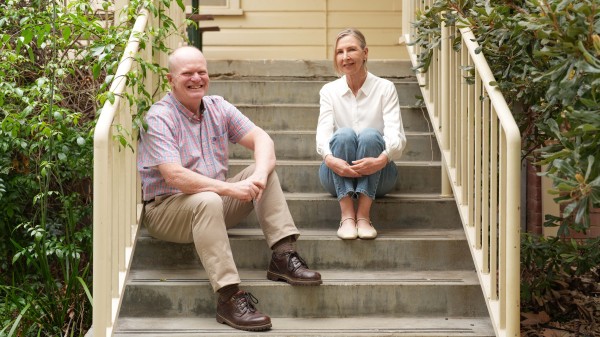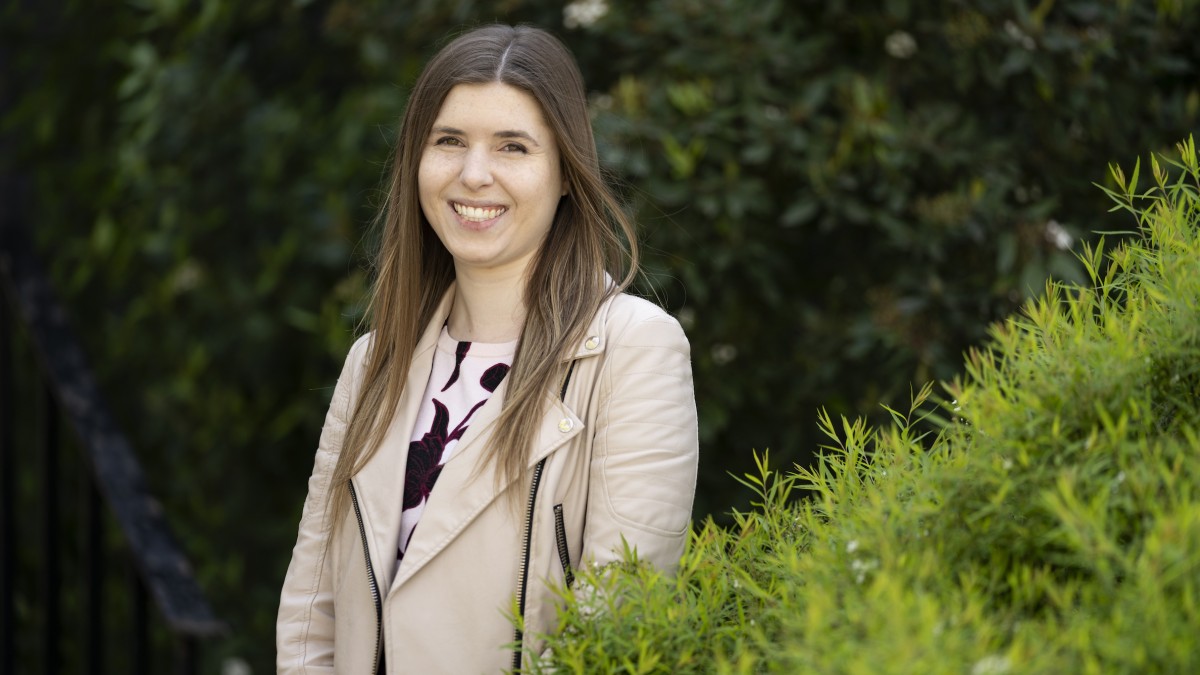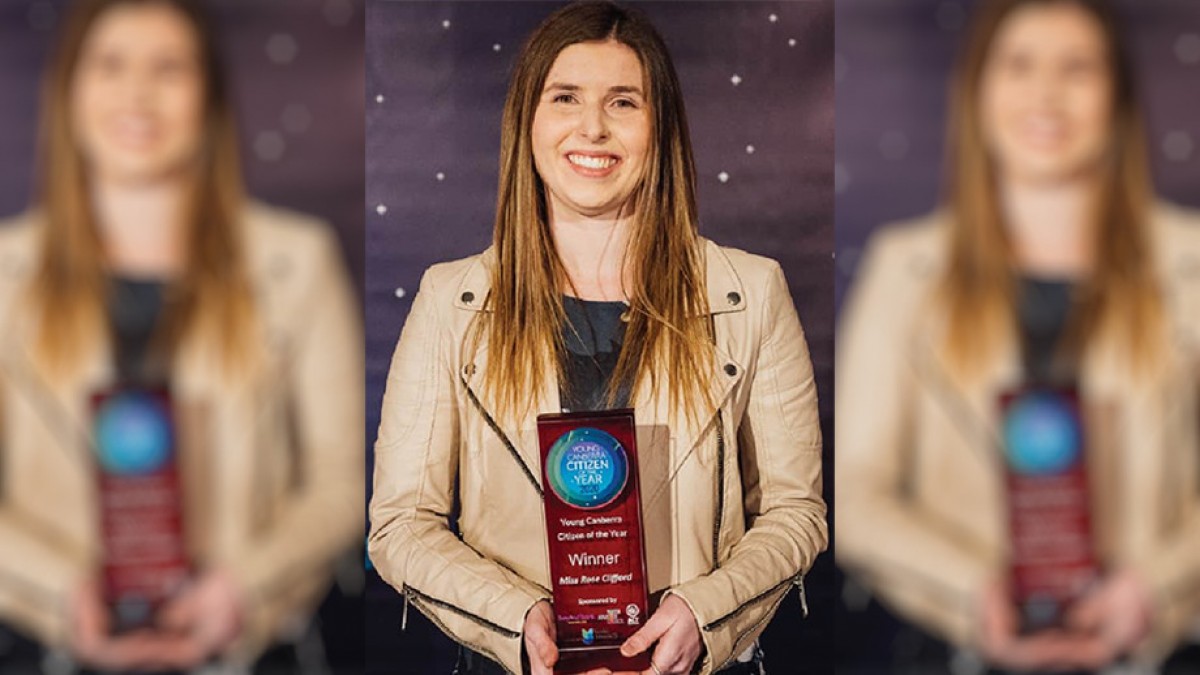Rosemary Clifford, a PhD student from the ANU Research School of Psychology, has won the 2020 Young Canberra Citizen of the Year Award for her work delivering and developing education programs for Mental Illness Education ACT (MIEACT).
As part of this work, she visits ACT schools to speak with students about her own mental health difficulties and the importance of seeking help.
This is an edited version of the story which Rosemary shares with those students.
Content warning: eating disorders
My story starts, like with most people, in high school. You're trying to fit in, you're trying to be this perfect person, have friends, and that kind of stuff. Overriding all of that for me was the comments I would get about my physical appearance, and not in necessarily a negative way. Well, I didn't think it was a negative way at the time.
People would make comments about how small I was, and how thin I was. Even though most people would assume that's a really positive thing to hear, when it's coming from the people you're attracted to, it just sounds like something negative. To me, it sounded like, I'm not good enough. I'm too this, I'm too that. Whatever it is, I'm just not enough.
It wasn't until I looked back on it and thought about those comments, that I saw they actually impacted the way I see myself. What became important was, I'm a skinny person. That's what people seemed to value about me because it's what they talked about. When I talked to my friends who were girls, it was always, 'Oh, I wish I was as slim as you'. And it became a sense of who I was. I was that petite, small girl.
Through all of this, I was coping with a tremendous amount of stress and anxiety that I didn't know I had, which was impacting everything I did. It would take me two weeks to do an assignment that would take everyone else only a week to do. Or I would have to start my assignments the second we got them, because I couldn't be doing it right up until the due date.
I would notice these things that made me different and I started to look at myself and go, 'Why am I so different? Am I defective? Am I broken? Because everything seems a lot harder for me to do'. I was just being pushed down and down.
I got to a point where I was like, 'Yeah, okay, cool. This is me. I'm just difficult and annoying and more work than the average person, but what can I do about it?' I had this really negative view about myself. But hey, you know what? At least I'm slim. And that's something that people seem to value.
I went to university and the workload got worse, and it got harder, so I dedicated even more time to it. I didn't see my friends for weeks on end. I would go to an event for a couple of hours because I had to go home and study. My weekends were filled with writing study notes and re-watching lectures that I had already attended. The very thought of submitting an assignment late, or working on it right up until the deadline, would make me throw up it was so terrifyingly scary.
During this time, I was separated from a lot of my friends and I felt very isolated. Those connections that kept me going, they disappeared. Two of my best friends had decided to cut me out of their life completely, which made me feel invisible and worthless.
All I felt was, 'You suck at everything. You're absolutely crap at everything that's going on in your life, except you're still that skinny girl'. And that's something that's worth valuing, apparently. I funnelled a lot of my anxieties and my issues into that area. I thought, 'Oh, gosh, I can't let this one thing that I'm really good at slip away'.
So I changed my behaviours, I started eating better and exercising better on the basis of getting healthier, because I was recognising that I was really overtired and I was not working efficiently. I was like, 'If I get back into exercise, and I eat healthy, I'll probably feel better'.
Unfortunately, for me, that one ounce of control that I got from doing those things became like an addiction, and that's how eating disorders do come on: they're addictive behaviours that you just can't let go of because you're getting such a positive outcome from it. The exercising went from a regular amount to an obsessive amount. The calorie restriction went from just cutting down crap to cutting out everything, except for a handful of foods that I'd deemed safe. And I just kept spiralling down and down.
I focused on my study, and I focused on this ambition of becoming a perfect, ideal body weight. There is no actual perfect, ideal body weight but I always thought there was. I would lose a bit of weight, but it would not be good enough. I would set a new goal to lose more, or I would cut certain foods out and feel so proud of myself. It spiralled into a mixture of overly obsessive behaviours to do with exercise and food.
I was living at home at this point and my mum was watching my behaviours. She noticed it spiralling too. She was checking in with me so frequently that it got to a point where I was like, ‘Why is she asking me this? I'm perfectly fine. I'm just trying to get better physically and look a particular way. And that's what everybody wants at some point in their life'. But because she was asking so much, it made me think, ‘What is actually going on?’
In what is probably the most insightful moment I've ever had in my life, I thought, 'What would she be seeing from the outside? If my friend was doing what I'm doing, what would I think?' And being a psych student, I knew it wasn't good. I said, 'Mum, I think I might be struggling'.
And from there, she was off like a bullet train down the tracks. We went to a GP and he gave us a mental health plan. And then we went to a dietitian. And then we tried to get into the eating disorder program here. And it was a big, long, slog of doctors and blood tests and all that kind of stuff. She was calling the eating disorder program every single day for over a month, saying on the phone, 'Every day you don't take her, is a day she's closer to death'.
A lot of that time is a blur. I remember bits and pieces of the recovery process, but I don't remember a lot. When you starve yourself, your brain starves too, so throughout that period, my capacity to form memories dropped off.
The thing I do remember is being terrified. Terrified, 24-7. I was trapped in my own body and I was scared. And the thing I was scared of was food. It sounds like the stupidest thing in the world to be scared of. The idea of eating a doughnut would drive me into a panic attack and I would spend the afternoon crying over the very prospect of it. I would hyperventilate if somebody forced me to eat one.
Physically, I was so cold all the time. My hair was starting to fall out. I couldn't sit comfortably on a chair for more than 20 minutes because I could feel the bones in my legs pushing into the chair. I was just uncomfortable the whole time. I was wearing jumpers in summer when it's 34 degrees. None of this was actually a concern to me, and looking back, that terrifies me, the fact that I lost the ability to want to survive.
Internally, I was lethargic all the time. I was having trouble sleeping, I couldn't shut my brain off. I would wake up scared. I wouldn't go to bed until two in the morning because I had to exercise so much, driven by my fear of gaining weight. I was scared of gaining weight. I wasn't scared of somebody coming into my home and murdering me, but I was scared of, you know, a cupcake. I look back and I go, ‘That is so weird and so stupid’. But that's where I was.
Through the whole recovery process, we went through something called the Maudsley Method, where the family unit acts as the therapist at home, and they strip the person who's mentally unwell of all the control. They can't make their own meals; they can't choose their own meals; they can't be in the kitchen when meals are being cooked. Mum or Dad had to sit and eat every meal with me. I couldn't be alone. For about a month, I spent every second, apart from taking a shower or sitting on the toilet, with somebody next to me. It was a lot of steps forward, but it was like 100 steps back as well.
I was drowning in these negative critiques that were coming from my own brain and this feeling that I was worthless. It was a really hard place to be in because one side of me was like, 'Eat the apple, eat the banana, and get better'. And then the other part of me was like, 'If you eat that food, you will get fat, and you will be a worthless bag of crap'. And that was what was going on internally the whole time.
Dad asked me, 'Why is it so important for you to not eat the food?' He just couldn't understand it. And I was like, 'Honestly, the voice screaming profanities and negative things inside me is so much scarier than dying at this point'. Because your options are: you die and you don't hear the voice anymore; or you hear this voice berate you 24-7 for being a bag of crap. That's how it felt. It wasn't until I started to put more weight on and go further and further into my recovery that the voice started to get quieter, and I was more able to take control of it.
Coming out the end of all that, I have a lot of issues with food still. Luckily, it's more about panicking that I'm eating enough and being worried about losing weight again, which I think is a better place to be in until I am completely recovered.
After I got better, I guess I was expecting that I could wipe my hands of it. But I couldn’t. Because for me, it's always going to be there. I'm always going to be at risk for the same behaviours. I'm always going to be in a place where if my anxiety shoots up here, then my health will shoot down there.
That, I think, is the hardest thing to come to terms with. You slog through this really hard period and now you've got slog through the rest of your life, making sure that you don't fall back into it. And I had to change my whole way of going about things.
The final stage of my recovery was actually finding value in who I was outside of my appearance and outside of what I thought were my valuable features. I'm still a slim person, that's just how I was built, but that's not my defining feature anymore. That was one of the hardest things to overcome because growing up, I had held on to that for so long as something to value.
And so, where am I now? I'm a PhD student studying psychology. Late last year, I bought a house with my future husband. We are going to get married at the end of this year - not the way we intended but still, it's going happen. I just won this award and I'm in a place, for the first time, where I'm actually proud of the person I am.
I think something that scares people about mental illness is that it's either going to ruin your life or you're never going to have your life back. And while it's true you're never going to have your old life back, it's not going to ruin your life; it's going to change who you are as a person. This experience has made me who I am. If I didn't have that, I wouldn't be here and I wouldn't be the person I am. And I like who I am. Not always, but sometimes, and that's enough right now.
If you, or anyone you know, is experiencing an eating disorder or body image concerns, contact the Butterfly Foundation National Helpline on 1800 33 4673 (ED HOPE) or visit butterfly.org.au









